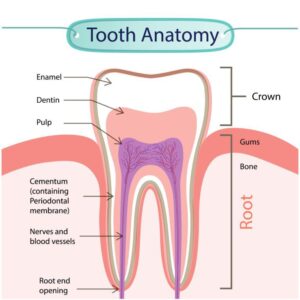If you live in Canada, you likely enjoy some delicious ice cream during the summer months or a hot beverage in the winter. Have you ever felt discomfort or pain after that first bite or sip? If you have, you are not alone. This pain could be caused by a cavity, but it is also common to people who have sensitive teeth.
Tooth sensitivity isn’t uncommon, and it is exactly what it sounds like: pain or discomfort in teeth as a response to stimuli, such as hot or cold. Tooth sensitivity can affect one or more teeth and can be temporary or chronic. Left untreated, sensitivity can get worse but it is often easily treated with a change in your oral hygiene routine.
So how do you know you have sensitive teeth? Generally, you will feel pain at the roots of your teeth with certain triggers. These triggers include hot or cold foods or beverages, sweet or acidic foods or beverages, cold air, or during brushing, flossing, or using mouthwash. These symptoms can come and go and can feel mild, moderate, or severe.
Causes
Tooth sensitivity is more common in people with thinner enamel. This is the outer layer of the tooth that acts as a shield to protect the dentin, which is the second layer of the teeth where the nerve endings are.
Some of the reasons that tooth enamel can be worn-down are from brushing your teeth too vigorously or using a hard toothbrush with stiff bristles, grinding your teeth, and regular consumption of acidic foods and beverages. Other causes of weakened enamel are conditions that cause vomiting, like bulimia or gastroparesis, or conditions that cause acid to come up from the stomach, like GERD.
Exposure or damage to your teeth can also lead to sensitivity. Recession of the gums, tooth decay, broken, or chipped teeth or worn-down crowns or fillings may also leave parts of your tooth unprotected or exposed and sensitive. In these cases, you are more likely to feel the sensitivity in only one specific area of your mouth.
You cannot diagnose tooth sensitivity yourself; a dentist will need to complete an examination to determine the underlying cause and appropriate method of treatment that will be most effective for you.
Diagnosis
If it is your first time feeling tooth sensitivity, make an appointment with your dentist in Cambridge. At Riverfront Dental, we can examine the health of your teeth and check for untreated cavities, tooth decay, loose fillings, or recessed gums that could be the cause. During a routine cleaning, a dentist can use dental tools to check for specific causes and help you find a solution.
Treatment
Repairing broken or chipped teeth or loose fillings in many cases will correct the problem. If your sensitivity is due to weakened enamel, try a toothpaste specifically formulated for sensitive teeth. These kinds of toothpaste limit the ingredients that irritate teeth and also contain ingredients that can desensitize your teeth to the pain or discomfort from the nerves of the tooth.
Always choose an alcohol-free mouthwash and select a softer-bristled toothbrush. Make a point of brushing your teeth more gently to prevent enamel loss and gum recession.
If these solutions are not effective after 3 weeks, you may need to ask your dentist for special treatments. These may include prescription toothpaste and mouthwash, or desensitizing agents applied in the dental office, such as a fluoride treatment or fluoride paste. These can help strengthen the enamel of your teeth to decrease pain and discomfort.
If you have underlying medical conditions, you will want to ensure they are treated before it causes damage to your teeth. Dietary changes may be necessary such as eliminating acidic foods like citrus, pineapples, and kiwis. Receding gums can be treated with a procedure called a surgical gum graft. A special resin can be applied to cover sensitive, exposed dentin and stop your pain. Teeth grinding can be curbed by reducing stress, decreasing the use of caffeine before bed, and also with the use of a mouthguard at night. Your dentist can help you find the right one!
You do not have to live with the pain and discomfort of tooth sensitivity, your dentist in Cambridge can help diagnose the cause, and start you on a treatment plan immediately. Many treatments are effective in just a few short weeks and are permanent so you can get back to enjoying your delicious ice cream or hot coffee quickly. Keep in mind that returning to your old habits can cause sensitivity to return, so maintain good oral hygiene practices with your Cambridge dentist to ensure success.




Recent Comments